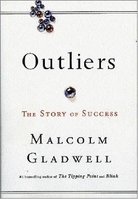Book Review: Success by connections - and luck
Published: Sunday | March 15, 2009

Title: Outliers - The Story of Success
Author: Malcolm Gladwell
Reviewer: Alfred Sangster
This is the third book by Malcolm Gladwell, who has developed a reputation for the unusual, the provocative with a challenge to currently accepted ideas. The preceding two, Tipping Point and Blink, have both been international best-sellers, and so too is Outliers. The title is, for starters, unusual, and many people will need to reach for the dictionary to find the meaning of the word, and even so, the meaning - something different from the main body or a statistical observation markedly different - would hardly give any indication of what is coming in the book.
boot straps
Gladwell's thesis on success, developed in the two major sections of the book is that:
People who have been very successful in life did not do it on their own - with the common belief of boot, straps, rags to riches and of individual merit - but rather had huge support for that success through family, good luck, when they were born, and more. People do not rise from nothing, rather the question that must be asked is not so much what they have done, but rather where they came from.
Social factors have often conditioned behaviour, and the need to challenge and change these factors has led to success or failure.
The book is dedicated to 'Daisy', Malcolm's grandmother, and her story is developed in the final chapter of the book, A Jamaican Story. For Malcolm is the son of a Jamaican mother and an English father who himself - in reading between the lines of the book - has seen success through the very opportunities that his environment provided. He has been recognised by Time magazine as one of the 100 most influential thinkers. Here, then, is another famous person with Jamaican roots.
The book is well researched with keen attention to detail, with statistics that make the case convincing. The author is not afraid to challenge traditional myths about achievement, success, education and social intervention.
secret of health
The introductory chapter, 'The Roseto Mystery', examines the secret of the health of a small township in Pennsylvania which was populated by Italian immigrants. It turned out that the demonstrated health of the population had nothing to do with genetics or food intake, the common factors at the time, but rather how the people related as a community. This was a radical idea at the time and Malcolm states that:
"I want to do for our under-standing of success what Dr Stewart Wolf did for our under-standing of health."
twin sisters
The final chapter of the book, titled 'A Jamaican Story', describes the experiences of the twin sisters Joyce (Malcolm's mother), now Mrs Gladwell, and Faith Nation, now Mrs Linton.
These sisters, with their own families, have carved out successful careers in counselling and Christian ministry. But as in all the other cases of success that Malcolm quotes, there were opportunities that surrounded those sisters as they faced the potential of growing up in a Jamaica that was dominated by opportunities for the lighter skinned. Malcolm's grandmother pushed, prodded and borrowed from a willing Chinese shopkeeper to see her daughters move forward.
He concludes the chapter with the comment that:
"Superstar lawyers and math whizzes and software entrepreneurs appear at first blush to lie outside ordinary experience. But they don't. They are the product of history and community, of opportunity and legacy. Their success is not exceptional or mysterious. It is grounded in a web of advantages and inheritances, some deserved, some not, some earned, some plain lucky - but all critical to making them who they are."
For those reading the book, which is highly recommended, we would have to agree that Malcolm Gladwell makes the case he set out to. Should some of his ideas take root among policymakers, there could be a quiet revolution in achievement levels worldwide.
